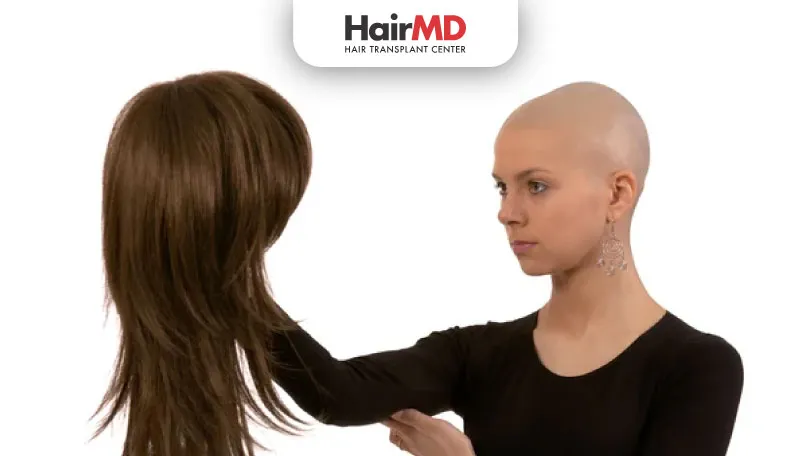9th August, 2024

The easiest, cost effective and pain free way to restore lost hair is by wearing wigs. Colourful wigs, wigs with hairstyles, bangs and what not, wigs are available for almost every look you want.
But can wearing them cause hair loss? Sounds crazy doesn’t it? However, it is true! Wigs may cause hair loss. If you wear a wig then continue with the blog to know everything about wigs and hair loss.
What’s covered in the article?
- What Causes Hair Loss?
- Do Wigs Cause Hair Loss?
- How to Treat Wigs and Hair Loss?
- Conclusion
What Causes Hair Loss?
We shed 50-100 strands of hair each day as a part of the natural hair growth cycle that consists of three phases- anagen, catagen and telogen. In this cycle, the old damaged hair from the follicles is removed and replaced by new ones. However, hair loss is a different condition where more hair strands fall regularly. If not treated, hair loss may lead to problems like baldness. Hair loss may occur due to any external or internal factor including wearing wigs and may cause permanent damage.
Do Wigs Cause Hair Loss?
Wigs can modify your appearance and give you the perfect look you wanted, but do you know that they can make your hair fall. Yes, wigs may lead to hair loss problems. Traction alopecia is one of the most common problems arising due to wigs. The clips, material and glue used in the wig can constantly pull your hair and may lead to hair loss. Wearing a wig for a prolonged period can lead to sweat retention and secretion of excessive sebum which can clog the pores and lead to damage. Sweat and improper hygiene can cause infections such as dandruff which can become a reason for hair loss.
How to Treat Wigs and Hair Loss?
Wigs can make your hairline recede, to stop hair loss due to wigs you must not wear them too often. You must not pull your hair to make appealing hairstyles and say no to any wig that hurts your scalp. You must clean your scalp and wig to prevent scalp infections. If your wig is making your hair fall out then you must stop using it immediately or look for another one that does not pull your hair. Treating the cause is the most crucial step in reversing hair loss.
You can wear a wig however, you must follow the above-mentioned parameters to prevent hair loss. If you are suffering from excessive hair loss then consult with an expert hair doctor at the earliest. The dermatologist will prescribe you proper treatment as per your hair loss condition to reverse the hair loss.
Do You Know?
Nearly 250 Patients Visit HairMD
Everyday For Various Hair Concerns?
(You are one click away from flawless skin)
Meet Our Dermatologists
Conclusion
In conclusion, while wigs provide a convenient option for covering hair loss, they can also contribute to further damage if not used properly. Tight wigs or poor maintenance can lead to conditions like traction alopecia and scalp infections. To avoid these issues, it’s important to practice good hygiene, choose well-fitted wigs, and give your scalp regular breaks.
Further Reading
Itchy Scalp and Hair Loss: Causes, Treatments, and Prevention
Itchy scalp and hair loss can be troubling, hinting at deeper scalp and hair health issues. Discover the connection in this comprehensive guide.
Dandruff Fungus Treatment
Learn how dandruff and fungus impact scalp health. With HairMD, you can get expert advice on causes, treatments, and prevention tips to maintain a healthy, flake-free scalp.
Helmet Use and Hair Loss: What You Need to Know
Does wearing a helmet cause hair loss? Understand the connection, debunk myths, and explore preventive tips with expert insights from HairMD.
Top Causes of Hair Loss in Women and How to Address Them
Discover the key causes of hair loss in women, including hormonal changes, stress, and nutritional deficiencies. Learn effective solutions and treatments with HairMD experts.
Have thoughts? Please let us know
We are committed not only to treating you, but also educating you.











